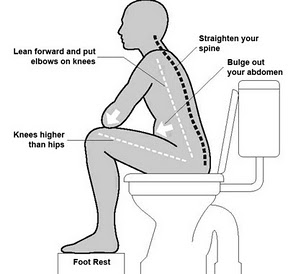Educating and Empowering You to Heal, Thrive, and Live a Happy, Healthy Lifestyle
Natural Remedies to Cure Constipation
 Constipation is the #1 gastrointestinal complaint in the U.S. affecting nearly 5 million people.
Constipation is the #1 gastrointestinal complaint in the U.S. affecting nearly 5 million people.
Women are twice as likely as men to suffer from constipation, and it tends to be more common in those over age 65. Normal bowel transit time is 12-24 hours. From a functional perspective, an individual is considered constipated if one full day passes without a bowel movement.
Constipation is a stressor on the body that affects overall health, quality of life and leads to an accumulation of body wastes, metabolic by-products, and increases an individual’s toxic load. Unreleased wastes produce toxins related to fermentation, protein putrification and rotting, and can become a breeding ground for parasites, yeast, Candida overgrowth, bacterial overgrowth, dysbiosis, diverticulitis, Crohn’s disease, colon polyps, and an increased risk of colon cancer and many other diseases.
Symptoms and Side Effects of Constipation
Infrequent bowel movements can cause all sorts of ailments including:
- gas and bloating
- a distended belly
- fatigue, brain fog and irritability
- headaches
- diverticulitis, prolapsed bowel, colon polyps
- bad breath, body odor
- a coated tongue
- insomnia
- yeast, bacterial, fungi and Candida overgrowth
- hemorrhoids and varicose veins
- congested lymph
- liver and gallbladder dysfunction
- gallstones
- eczema, acne, hives and dark circles under the eyes
- poor absorption issues and several nutrient deficiencies
- dementia and cognitive disorders
One of the first early signs of dementia, Parkinson’s and cognitive dysfunction is constipation.
If you experience constipation, resorting to laxatives is not the answer. Regular laxative use can be quite harmful, destroying healthy intestinal bacteria, micobiome disturbance, damaging the colon and leading to laxative dependence, dehydration, chronic constipation, and even death.
The first step toward healing is to identify the root cause of constipation.
Causes of Constipation
- Chronic constipation is almost always caused by gut dysbiosis, decreased peristalsis, leaky gut, small intestinal bacteria overgrowth (SIBO), H.pylori, yeast and Candida overgrowth, parasite infections, C. diff, dysbiotic bacteria, mycotoxicity and fungal infections.
- Insufficient bifidobacter, a species of healthy bacteria in the colon
- Bile insufficiency, congested and stagnant bile
- Low stomach acid (hypochlorhydria)
- Anxiety, chronic ongoing stress, adrenal insufficiency
- Poor diet.
- Food sensitivities. Eating inflammatory foods the body is sensitive to (most common culprits dairy, wheat, corn, soy, artificial sweeteners, sugar, grains and gluten). Grains, including whole grains contain anti-nutrients that irritate and inflame the bowel wall.
- Lack of fibrous veggies, plant foods and leafy greens
- Poor vagal tone. Constipation may very well be a brain problem. The brain sends signals to the gut via the vagus nerve to convey when it is time to digestive and have a bowel movement.
- Dehydration
- Decreased peristalsis, leaky gut and GI dysfunction
Other common root causes for constipation
- Medications: Antidepressants, opiates, antacids and proton pump inhibitors (PPIs), antibiotics, iron supplements, and many other prescription and OTC medications
- Overloaded, congested liver and gallbladder, sticky bile and a need for bile salts
- Pregnancy can cause temporary constipation
- Some diseases (Parkinson’s diabetes, kidney disease, colon cancer, neurological disorders or muscular diseases)
- Environmental chemicals and toxins. Pesticides, GMOs, glyphosate, chlorinated and fluoridated water, chemical exposure, aluminum, mercury, lead and heavy metal toxicity.
- Low thyroid function, Hashimoto’s disease, autoimmune disorders
- Low serotonin
- Magnesium deficiency
- Weak abdominal muscles from lack of exercise
- Excess iron found in some baby formulas. Extra iron is quite toxic for most babies and can contribute to constipation and other problems such as infections.
- Sympathetic dominance, poor parasympathetic tone, chronic stress, anxiety and unresolved emotional issues affecting colon muscles
- Nutrient deficiencies including magnesium and vitamin B deficiencies needed for colon nerves
- Pyloric or ileocecal valve dysfunction
- Pelvic floor dysfunction
- Minor dislocations of the spine
- Stagnant, congested lymph
- Laxative overuse and abuse. Laxatives are the third top selling item at drug stores and roughly $725 million is spent annually on laxatives! Do NOT use laxatives—they deplete bile!
Constipation is not just a symptom of a lack of fiber. Constipation is the result of incomplete digestion anywhere in the digestion tract.
Natural Remedies to Cure Constipation
Use Food as Medicine to Cure Constipation
- Always start by modifying the diet. Eliminate all processed foods, sugar, peanut butter, artificial sweeteners, non-organic foods, glyphosate and GMOs, which wreak havoc on your gut.
- Strictly limit offending inflammatory foods: all grains (including whole grains), gluten, dairy, corn, soy and sugar, which are very difficult on digestion and culprits that trigger constipation and weaken the intestinal wall. Cutting out gluten, grains and sugar intake will slash colon cancer risk, improve digestion and bowel function, and improve your health in a wide variety of other ways as well.
- Remove dairy products, except butter. Lactose intolerance is a major cause of constipation in children.
- Avoid all processed factory-farmed frankenmeats. Remember, you eat what the animal ate!
- Drink plenty of filtered water every day away from mealtime to keep the cells and tissues of the intestines hydrated. Add a pinch of unprocessed sea salt.
- Fiber up! Increase intake of plant foods, vegetables, bitter leafy greens and low sugar fruits, NOT grains and starches.
- Include fiber-rich prebiotic foods such as dandelion greens, artichokes, asparagus, jicama, onions, garlic and chicory root.
- Include healthy fats. The intestinal cell walls are made up of fat and need healthy fats to function well. Healthy fats such as organic extra virgin olive oil, avocado, pastured butter, ghee, coconut oil, macadamia oil and fatty fish help to lubricate the bowels and move waste through the colon.
- Include grass-fed, pasture-raised butter. Butyric acid found in butter is a short-chain fatty acid produced by friendly colon bacteria from fully digested fiber.
- Sip on organic tea away from mealtime: Dandelion root, senna, yerba mate, green tea, ginger, Smooth Move, peppermint tea
- One tablespoon sesame oil taken before bedtime.
- Aloe vera juice in the morning and also after meals softens and helps unwanted material to slide out more easily. It also reduces inflammation in the gut, and helps soothes the stomach lining and intestinal walls.
- Avoid carbonated drinks and chewing gum
- Include healthy herbs and spices like turmeric, cumin, garlic, coriander, fennel and ginger to stimulate digestive fire.
Lifestyle Tips to Cure Constipation
- Heal and seal the gut. Many functional experts agree that 90% of all disease starts in the bowel. Even the brilliant and ancient physician, Hippocrates quoted that “all disease starts in the gut.”
It is extremely important to identify the root cause of gut dysfunction and optimize gut function. Possible causes include HCL deficiency, bacterial overgrowth, lack of healthy flora, gut pathogens such as H. pylori, Candida overgrowth, yeast or parasites, SIBO, IBS, leaky gut or intestinal permeability.
A comprehensive PCR stool test that screens for pathogenic organisms including parasites, yeast, dysbiotic bacteria, Candida overgrowth, levels of healthy gut flora (bacteria balance and imbalances), absorption, inflammation, immune function (sIgA), short chain fatty acid status, intestinal pH and other biomarkers of GI health. 
- When you sit on the toilet for a bowel movement, place your feet on a stool so your knees are raised.
- Pay attention to how you deal with the stress in your life, which impacts parasympathetic tone, digestion and elimination.
- Practice yoga consistently. Certain yoga asanas especially twists, forward folds, and inversions stimulate digestive fire and are very effective for curing constipation.
- Maintain a good sleep routine.
- Daily exercise. Rebound on a mini trampoline. Take a walk after meals. Weight training. Yoga.
- Address underlying emotions. As the saying goes, “let go and let God.” Let go of what you’re holding onto mentally and emotionally. Release old ideas. Rigid thinking, resentments, unresolved anger, prior emotional trauma and holding onto the past can cause constipation. According to Chinese medicine, an inability to grieve and let go is linked to an imbalance of the large intestine.
- Avoid prescription and OTC drugs, acid-blocking drugs (antacids), antibiotics, iron supplements and laxatives.
- Use the bathroom when you have the urge. Do not hold it.
- Rule out an hypothyroid and irritable bowel disease (IBD-C)
- Optimize liver, gallbladder, lymphatic and kidney function.
- Learn to s-l-o-w down, relax and activate the parasympathetic branch of the nervous system. Practice deep, full belly breathing and relaxation techniques every day. Soak in an Epsom salt bath, listen to your favorite music, meditate, walk in nature, read something spiritual, listen to something inspirational, participate in an activity that you enjoy
- Apply castor oil compresses over the abdomen, 3-4 times per week
- Massage your ileocecal valve area, which is located between the large and small intestines. The ileocecal valve acts as a block that prevents toxins of the large intestine from backing up into the small intestine. It also keeps food in the small intestine from passing into the large intestine before the digestive processes has been completed. When this valve doesn’t open, feces stays in the small intestine unable to move any further. This back-up causes constipation.
- Acupressure. Place your fingertips below the navel and gently push in about an inch. Hold for 1-2 minutes while taking deep slow breaths.
- Strengthen vagal tone to restore balance to the nervous system
Nutrient support for Constipation and a Happy, Healthy Colon
Primary Nutrient Support for Constipation
- Sporebiotics and a high-quality multi-strain probiotic
- Hydrochloric acid, digestive enzymes, and bile support
- Magnesium taken on an empty stomach; dose up to bowel tolerance. Studies have suggested that low magnesium may be associated with higher rates of colorectal cancer among other diseases
- Filtered water with unprocessed sea salt
Secondary Nutrient Support for Constipation
- Vitamin C to bowel tolerance
- Butyrate, a short chain fatty acid is the primary fuel source for coloncytes
- Triphala, an Ayurvedic herb is helpful for constipation
- Liver and gallbladder (bile) support
- Vitamin D
- B vitamins
- Omega-3s and essential fatty acids
Video: Drug-free solutions for diverticulitis
Related Posts
- The Importance of Stomach Acid and How to Increase Your Stomach Acid Naturally
- Signs and Symptoms of a Magnesium Deficiency
- How to Stimulate the Vagus Nerve and Strengthen Vagal Tone

